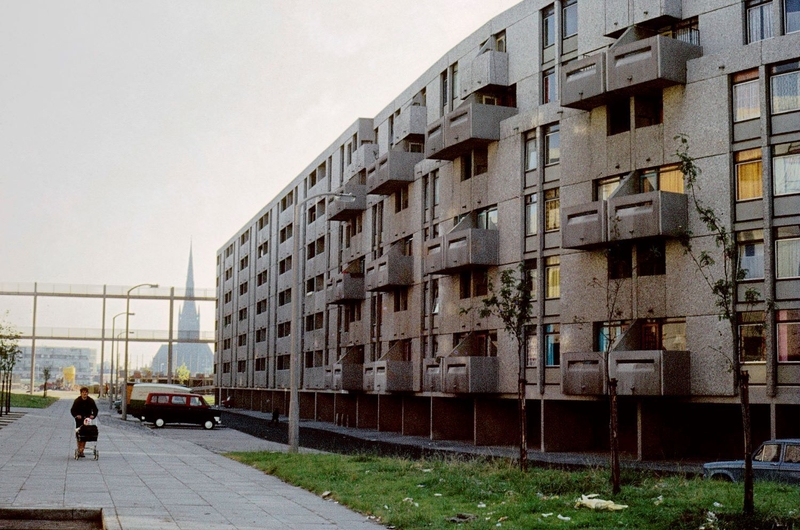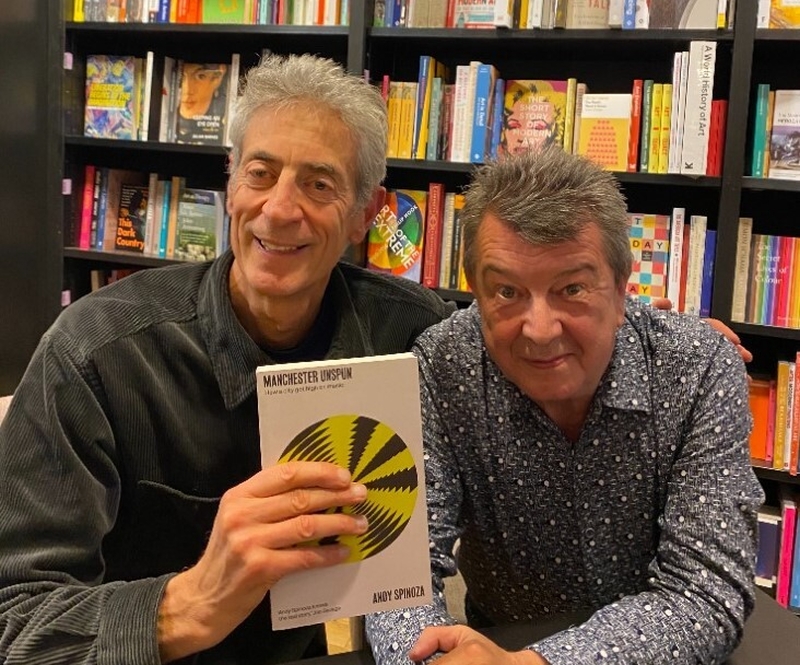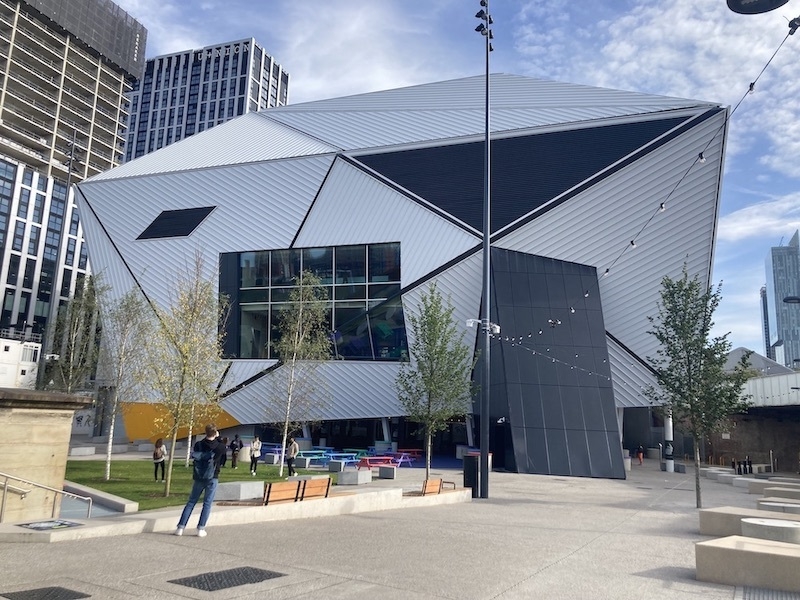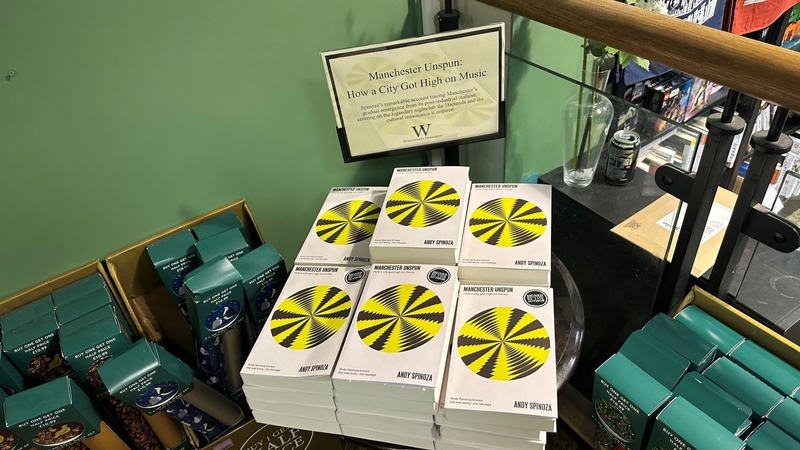As an important Manchester book returns in paperback, here's a long read from Jonathan Schofield
Dancing in the rubble
"We danced in the rubble. Manchester seemed in many respects an alienated, broken place which appealed to people like me," says Andy Spinoza speaking to Stuart Maconie at a Q&A event in Waterstones for the launch of the paperback edition of his book Manchester Unspun. "It appealed because it had the best record company around with Factory, that independent image," he adds.
Spinoza was recalling Manchester in 1979 when he arrived from London and the city was a very different place. The centre was contracting, surface car parks pock-marked the urban core like a medical condition. On other sites buildings had simply fallen down and been cleared or in some cases left as rubble. Ringing the city centre there were bizarre, run-down, districts with deck-access flats and crumbling terraces.
Midweek, if you'd gone for a drink in, say, Mr Thomas’s, you would have been thrown out at 7.30pm because the pubs closed when the corporate customers fled back to the suburbs.
He's not the only one who remembers the rubble.
As a tour guide I was leading an Ancoats and New Islington tour in summer this year when a guest who’d grown up in the area in the seventies said to me: “We used to get offal waste from the butcher’s on Oldham Road and chuck it on the bank of Rochdale Canal which was all silted-up. The rats would come out for the meat and we’d shoot them with our air rifles. Sometimes we’d shoot at strangers walking down the canal as well for a laugh.”
The ex-local pointed to an area roughly where Cask bar sits in shiny New Islington.
Manchester city centre in 1979 was a Miss Havisham: an eccentric husk in ruined clothes, the best days gone.
Yet, the city bewitched Andy.
"There was a gothic melodrama about it," he says. "Despite being a place where I used to get beaten up, chased, run through the streets after a football match. Now look at these hulking grey monsters of Deansgate Square, no lights were on in Castlefield back then, there seemed to be no glittering scenarios. Yet there was a special sauce to the place."

Getting stuck into Manchester
We're meeting in Navarro Lounge at University Green, the latter another space unimaginable in 1979. I've known Spinoza for many years and shared many a glass across that time. I hadn't known much about his backstory though.
“When you arrived at University here, I bet you were thinking, I’ll do this course and then bugger off back to London as quickly as possible,” I say.
“Who can tell at eighteen or nineteen what the future holds but no, I didn’t think that,” says Spinoza. “I felt there was something here, potential. I think I put a marker down with an early attempt to engage with Tony Wilson (impresario, broadcaster etc…) and then with being part of setting up City Life magazine. I wanted to get in on the scene that I knew existed here and I worked hard to do that.”
“So, you created a space for yourself,” I say, “whether it was with City Life you co-setup in 1983, or even before that. You put yourself at the heart of things. What drove you to do that? I mean, it's not normal is it? I didn't go to Cardiff University and think, what I'll do is I'll go and meet the coolest guy in Cardiff and talk to the coolest bands.”
Spinoza pauses and then says: “I simply wanted to be part of the city. I say this right at the end of the book, Manchester gives people, many, many people, that opportunity to find that space. I couldn't have done that in London. I would have been swallowed up. And it wasn't that I wanted to be a big fish in a small pond, I wanted to be part of the city.
"I think in Manchester that still is the case, just about, you can go into the city centre, now a dynamic metropolis and you can run into people you know as you would do in a small village. There's something really beautiful about that.”
I say: "As Wilson said, Manchester is big enough and small enough."
"Yeah," says Spinoza. “I think that still happens to me even though the city centre as we know it, and as I put in the book, has practically tripled in size."
He pauses again.
"This book…look…I've been dying to get my ideas about the city that I have known, down on paper for years just didn’t know how to go about it. My ambition was always to be a writer of some description and I think every year I stayed in Manchester I saw lots of contemporaries leave and go to London, New York, Berlin, Hong Kong but there was always something that kept me here. I could see the way the city was changing and adding facilities if you like, whether it might be a stadium, an arena, a Metrolink, new residential."
"Writer and commentator Phil Griffin once wrote," I say, "how Manchester has been in love with itself for two hundred years. I use that quote on my tours with the caveat, that, it’s done this on occasion without any evidence it’s worthy of our love.”
“As stated in the book, Manchester made me, I owe it some love,” says Spinoza.

The character of this Manchester book
Spinoza’s, Manchester Unspun, isn’t a dull academic tome, annotated to hell and back, despite it being published by Manchester University Press (MUP). There are lots of serious and considered elements but there are a lot of laughs too.
"In a publishing meeting at MUP," Spinoza says, "one of the people asked how the book should be described. Matthew Frost, my editor, said, it's a serious book with jokes." He might have added, plus irony and tough-reading for some of those featured in its pages.
Spinoza continues: "It’s funny but when I started to write something it was kind of an AJP Taylor approach like a helicopter view."
"You mean from above as though you’re watching events taking place from a God-like perspective with all the knowledge to hand?" I say.
"Yes, exactly,” says Spinoza. “Matthew said no, we need you central to it, threaded through it. You have to be part of the book, it has to be your version of the story. And that gave me confidence, because I’d thought why is anyone going to be interested in me? I mean, I've been behind a lot of famous people and I've written a lot of speeches for Mancunian leaders but I'm not particularly well known outside of the media in Manchester. Anyway, he encouraged me to be more personal."
"I’ve been told the result is a strange mix you don't normally get. I wouldn't call it a memoir even though some people are calling it a memoir. It's an account. It's a kind of eyewitness account of how we went from a dirty old town to the skyscraper city from someone who was there, witnessed it first-hand. I’m aware this might be also seen as a very good reason to dismiss the book, that it's too personal, too partial."
This could indeed be the case. Fortunately Manchester Unspun is not too personal nor too partial, it's one man's version of events, yes, but the panache of the writing, the flow of the narrative and the simple number of stories about the city and its people in the last forty years holds the attention.
The proof of the pudding is in the eating. The hard cover edition sold out and the book is now flying off the shelves in paperback. This is not a history as such, it’s a very interesting and thoughtful journey through the immense recent changes in Manchester, which for various reasons is often seen as the paradigm city of the UK outside London and thus has gained traction far beyond the Greater Manchester boundaries.
But what drove Spinoza to put finger to keyboard in the first place. “How long has the itch been for writing this book,” I say. “Five years, ten years?”
“Not at all,” comes the reply. “I knew I wanted to do something in the back of my mind but it wasn't until Jon Savage (writer, music journalist) said to me, you've been in Manchester right through all these changes, haven't you? You've a story to tell.
"I had no work to do, I was closing down my PR business. And when someone like that opens the door even one millimetre the light comes through and I thought okay I'll give it a shot and, yes, I suppose it was therapeutic. I talk in the book about my adoption and the fact I had to get away from my extended family not because I didn't love them but because I just wanted to do my own thing and Manchester provided the platform.”
MIPIM, developers and politicians
The book depends completely on the strength of its stories, its recreation of the recent Mancunian past and its portraits of the characters at the heart of the tale. It doesn't pull its punches over some of the contradictions implicit within the city's growth.
MIPIM, the huge international property talking shop in Cannes, is sold as a place for Manchester to deliver its entrepreneurial derring-do to the world. According to Spinoza writing in the book: 'MIPIM was not where Manchester city council met the world’s property investors, it was where it went to talk to Manchester’s property classes. It was an annual promulgation of the current state of play in the city, and a chance for hundreds of people to have two-minute conversations they hadn’t got round to doing at home.'
"This is not the narrative we’re sold,” I say. "MIPIM is supposed to be where we get all that foreign investment in, isn’t it?"
Spinoza smiles: "You can make a case that over a 20-year period Manchester has managed spectacularly to attract foreign investment. If anyone said to me that that's what happened at MIPIM, then that would be untrue. What happened at MIPIM was part of the rising waters of Manchester's reputation that has led to the foreign investment, but that investment wasn’t sorted there."
Some of the MIPIM passages in the book read as the plot of a satirical sitcom about the commercial/political Manc world.
‘In 2008 the Manchester contingent’s bubble was burst by shocking news,' writes Spinoza. 'GMP’s Chief Constable had been found dead on Snowdon, and his chaotic and troubled life was starting to emerge.'
Problem was the 'Thursday final night' was coming up when delegates and 'the city’s contingent looked forward to their end-of-project knees-up at a nightclub.' Apparently, some national journalists were sniffing around but they were denied the address for the final bash. As Spinoza writes 'if the journalists had known that Manchester’s top-brass were relaxing in a Cannes nightspot while their home city was in a shock, a bucket full of poisonous PR was surely guaranteed.'
The book is full of the shenanigans of the commercial and political classes as well as their achievements. Manchester Unspun is never sly but it is blunt as it paints pictures of the knights, Sir Howard and Sir Richard, of MP, ex-council Leader and Confidentials.com correspondent Graham Stringer: or when it mentions SimpsonHaugh Architects and the latter’s cosy relationship with the city's planning department which consistently endorses their dominance of Manchester architecture.
Gary Neville crops up, of course. Developers including Mike Ingall of Allied London are included and described as both ‘a nightmare and inspirational’ to work with if ‘dysfunctional in PR terms.’
Andy Burnham makes an appearance several times, first at the Midland Hotel on a visit by The Times up North in the early noughties. Spinoza mistakes the fresh-faced youthful politician as a wine waiter.
Some of the passages in the book read as the plot of a satirical sitcom
Spinoza speaks frequently of the sheer strength of city leadership as Manchester city centre boomed and its national reputation blossomed. He finds it interesting this was the case more with Tory administrations rather than the Labour ones.
Remember Northern Powerhouse? And the weapon for renewal that culture rather than manufacturing became with, as Spinoza writes, ‘a Conservative chancellor of the exchequer gifting the city squillions for a new arts complex named after Tony Wilson’s heroic but hapless record label’. (Factory, has now become Aviva Studios, but the money was for Factory.)
“The acid test of whether Factory/Aviva Studios will be a success goes to the heart of my book," says Spinoza. "An art movement that basically started in a busman's social club in Hulme in 1978, then praised by a Conservative Chancellor and having million pounds of public money hosed into it has become this great big box approach to culture. Whether that will have the same strange, powerful, mysterious art that's as authentic and influential as that which came out of the rubble of the post-industrial city is open to question.”
Still, there’s plenty of admiration in the book for the sense of direction Manchester has had in the last decades, as usual laced with home truths.
“Strong personalities, strong leadership,” says Spinoza. “It's almost a cliche, isn't it? Every politician that wants to pay Manchester a compliment or business person who wants to invest mentions strong leadership.”
"Although that can mean different things," he adds. "It was the Financial Times that said Manchester's leadership is almost Chinese in its practice. I don't think they were talking about Confucius, were they? They were talking about the Xi Jinping style of Chinese control."

Celebrities, Factory and Wilson
Some of the most entertaining passages in Manchester Unspun are from those early years at City Life and as the diary editor of the Manchester Evening News. The Pizza Express and Christopher Eccleston story is a very fine example of this. There’s poignancy too over the peerless Caroline Aherne.
After being a very good cover star for City Life magazine, Morrissey demurred from being lit up in lights through an interview with Spinoza in the daily paper: 'I don’t (sic) seriously fancy my chances with the Moaning Evening News…Another 'miserable moors murderers' pop star effort and Im (sic) off to Aberdeen to sell cutflowers. Now there’s a threat!'
Name any star, local or visiting Manchester, in that period and Spinoza has an anecdote.
And in the background there’s always Anthony H Wilson, aka Tony Wilson.
“It was so hard controlling Tony Wilson’s presence in the book,” says Spinoza. “He could have dominated the whole thing, there's loads of stuff about Wilson I have that I haven’t put in, but he’s a big character in it. It was inevitable, given his significance in the city story over the last few decades, how he led by force of character.”
Spinoza quotes Durutti Column drummer Bruce Mitchell describing Wilson as ‘a rhino coming out of a thicket.’
Spinoza and I muse over the curious reaction to all the Hacienda and Factory nostalgia in Manchester in 2023. People equate it with Liverpool’s continuing Beatlemania. Surely Liverpool is right to play that up, to take the money. Jobs flow from the Beatles' fame, wealth enters the city. This doesn’t mean you stop young talent coming up, or that creativity is stifled.
It’s easy to understand why younger artists, writers and commentators turn away from Factory and Madchester as Confidentials' former writer Davey Brett did when he asked us to 'Stop shagging the Hacienda'.
Yet if some of those younger artists make as a much impression as The Smiths etc… we all know their grand-children will bemoan their memorialisation. ‘So it goes,’ as Wilson might have said.
Not that nostalgia was a preoccupation with Wilson, as Spinoza writes. He tells the story of when Wilson was interviewed about the Hacienda’s demolition, he said, "Who cares? It doesn’t matter," adding, “The Beatles left (Liverpool) in 1964 and never looked back.” As Spinoza points out Factory Records stayed in Manchester and that makes a difference.

Making sense of the city
There are issues with the book. In 1979 Greater Manchester towns such as Bolton, Rochdale, Oldham and so on were in a far better state in terms of amenity and confidence than they are in 2023, this is largely left out of the book. The central Manchester and Salford areas have prospered it appears at the other boroughs' expense aside from Trafford.
In some respects this is very much a story of the rebirth of the city centre, a personal record of how a city regained its va-va-voom. But then, as Spinoza says, "The book is about the city in the last few decades into which my own story is woven." It's the Manchester he was witnessing. Understand it as that and for anybody interested in today's city his book is required reading.
Given that point the subtitle for the paperback version doesn't do it any favours. The subtitle is 'How a city got high on music' and unfortunately gives the impression it's all about Factory Records and the eighties generation of bands when it is so much more.
One of the most moving paragraphs in the book is the final one.
‘People often refer to me as an adopted Mancunian', writes Spinoza. 'They won’t know the pointed meaning of that phrase for someone given away at birth; most people have the story of the people they come from, when for me there is a blank page. But my adoptive parents loved me, and Manchester made me. Countless others, I know, feel the same, that the city has made them who they are. I told stories of the city on my own blank page, and in trying to make sense of Manchester, I am still making sense of myself.’
The book was written at a changing of the guard in the city, Bev Craig is the Council Leader after 25 years of Sir Richard Leese, Joanne Roney is the Chief Executive after almost 20 years of Sir Howard Bernstein. New ideas are coming to the fore, the old certainties of development are fading.
What the next few years will bring is unclear. Indeed, what is this modern Manchester of tower blocks based upon?
For some people it's about talking bollocks about itself, bigging itself up. Chutzpah.
Spinoza’s book proves this wrong and shows it’s based on substance, on people making decisions, on delivery. Andy Spinoza might still be making sense of Manchester for himself but his book helps us all make sense of the huge changes witnessed in the city.
Manchester Unspun: How a city got high on music is now available in paperback priced £12.99. It is published by Manchester University Press.
On Wednesday 29 November at 6pm Jonathan Schofield is in conversation with Andy Spinoza on the National Trust's Castlefield Viaduct about Manchester Unspun. Tickets £10 including complimentary drink. Book here
Get the latest news to your inbox
Get the latest food & drink news and exclusive offers by email by signing up to our mailing list. This is one of the ways that Confidentials remains free to our readers and by signing up you help support our high quality, impartial and knowledgable writers. Thank you!

Join our WhatsApp group
You can also get regular updates on news, exclusives and offers by joining the Manchester Confidential WhatsApp group.

















